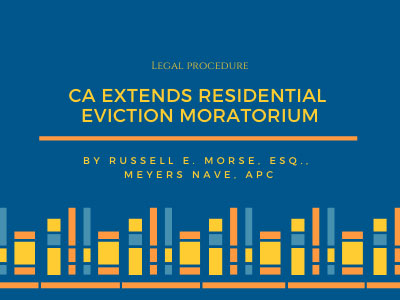
By Russell E. Morse, Esq., Meyers Nave, APC
At the end of January, the California Legislature passed Senate Bill (SB) 91. In addition to extending the existing eviction moratorium for residential tenants in California, SB 91 also adopted a new rental assistance program for landlords to recover some of their lost rental income due to the financial hardships caused by the COVID-19 pandemic. SB 91 extends the eviction moratorium until June 30, 2021. Accordingly, a landlord may not evict a residential tenant who is economically affected by COVID-19, submits a hardship declaration to their landlord, and has paid at least 25% of all rent due prior to June 30, 2021. In addition, a landlord is prohibited from collecting past due rent as consumer debt in small claims court until August 1, 2021. Landlords must send a notice by February 28 describing changes in the law to all residential tenants who are behind in rent for the period of March 1, 2020 to February 1, 2021. Failure to send the notice by the February 28 deadline may affect a landlord’s ability to exercise unlawful detainer remedies against tenants. Finally, the provisions of SB 91 do not apply to commercial tenants.
The new rental assistance program applies $1.4 billion of California’s share of federal rental relief funds to pay rental debt of tenants who meet three criteria: (1) a member of the household is unemployed or has been financially impacted by COVID-19, (2) the household is at risk of homelessness or housing instability, and (3) the tenant earns less than 80% of the area median income. The program is scheduled to begin by March 15, but is not guaranteed to have sufficient funds to assist all tenants who meet these criteria. First priority will be given to tenants earning up to 50% of area median income, and second to residents of communities disproportionately impacted by COVID-19. The program will pay landlords up to 80% of tenant rental debt accumulated from April 1, 2020 to March 31, 2021. As a condition of accepting State rental assistance, landlords must agree to release all other outstanding debt owed by the tenant for the period covered by the rental assistance. If a landlord does not apply to the State program, the tenant may apply instead, but State rental assistance to the tenant will be limited to 25% of rental debt. Landlords who refuse to participate may jeopardize their future recovery of rental debt, as courts will look to whether the landlord sought State rental assistance when determining the landlord’s recovery. SB 91’s requirements are complex and are likely to cause confusion for landlords, tenants and courts. We recommend all landlords and tenants speak to counsel regarding their rights and obligations under SB 91.
Categorized in: Legal Procedure
| << previous | next >> |








